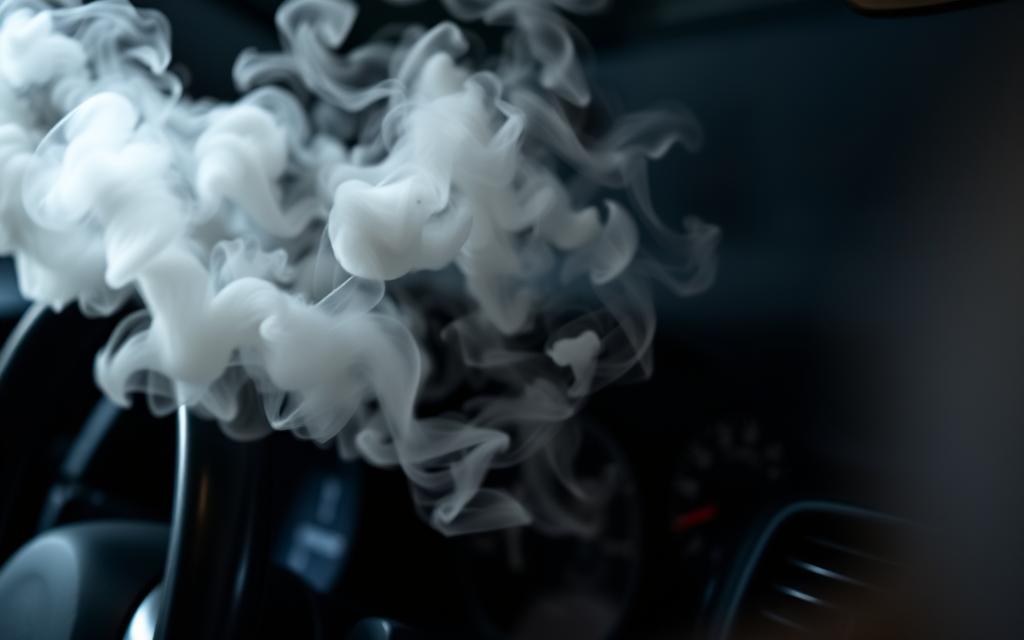Smoke or steam from the AC vents in your car can be a worry. It can happen in many car models, like a 2002 Ford Taurus. The issue might start suddenly and last for weeks. It can show up at different times, like when you start the car or after using the AC.
The smoke or steam might not have a smell. This makes it hard to find out what’s causing it right away.
This guide will explain why smoke or steam might come from your car’s AC vents. We’ll cover the different types of smoke and how to fix the problem. Knowing the causes and what to do can help keep your car cool and safe.
Key Takeaways
- Overheating of engine components is a common cause of smoke from AC vents
- Refrigerant leaks can lead to the production of smoke or steam in the AC system
- Electrical issues within the AC system can also result in smoke or steam
- Mold and mildew growth in the ducts can contribute to the emission of smoke or vapor
- Prompt action and professional assistance are crucial when dealing with smoke from AC vents
Understanding the Problem of Smoke Emission
Smoke coming from your car’s air conditioning vents is a common issue. It’s important to know the different types of smoke and what causes them. The look and smell of the smoke can help figure out the problem.
Identifying Smoke Types: White, Black, and Blue
There are three main types of smoke in car AC systems: white, black, and blue. White smoke usually means there’s condensation in the AC. It smells like nothing and can look like steam. Black smoke is a sign of a bigger problem, like an oil leak or engine burning. Blue smoke means there’s an oil leak, which can harm your engine if not fixed fast.
The Difference Between Smoke and Vapor
It’s key to tell smoke apart from vapor. Vapor is usually white and smells like nothing. It happens when moisture in the AC system condenses, often in humid weather. This isn’t usually a big deal.
Common Scenarios for Smoke Emission
- Smoke shows up when the AC is first turned on or after it’s been on for a while
- Smoke keeps coming out, no matter the outside temperature
- Smoke with a bad smell means there’s a serious problem
Knowing the different smoke types and their causes is the first step to fixing the problem. By understanding these common situations, car owners can spot the issue and fix it.
Possible Causes for Smoke from AC Vents
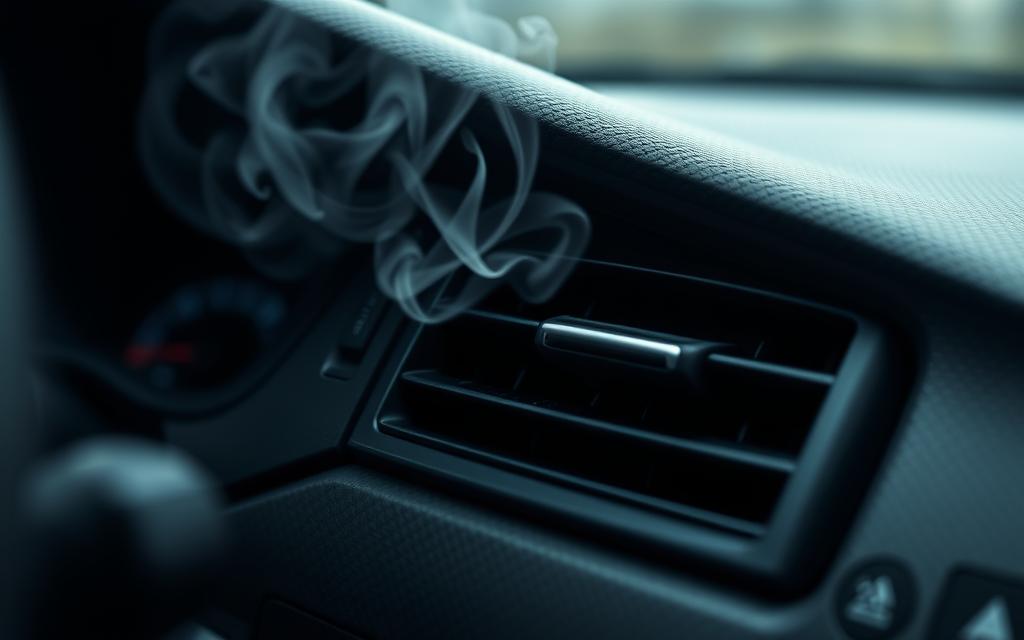
Smoke coming from your car’s air conditioning vents is a serious problem. It can be caused by many things, like an overheating engine, refrigerant leaks, or electrical problems in the AC. Mold or mildew in the ducts can also cause it. Knowing what might be causing it helps you fix it faster.
Overheating Engine Components
Smoke from the AC vents can also mean your engine is overheating. If the valve cover gasket leaks oil onto the hot exhaust manifold, smoke can get into the cabin. This is common in cars with 60,000 to 90,000 miles since the last valve cover gasket change.
Refrigerant Leaks and Their Impact
Refrigerant leaks are another reason for smoke in the AC vents. When refrigerant, like R-134a, leaks, it can turn into a smoke-like vapor. This not only causes smoke but also reduces cooling and can damage AC parts.
Electrical Issues in the AC System
Electrical problems in the AC system can also lead to smoke. You might smell burning rubber, which means it’s a serious issue. A professional mechanic should check it out quickly.
Mold and Mildew Growth in Ducts
Mold or mildew in the AC ducts can also cause smoke. This usually happens if the ducts aren’t cleaned regularly. Cleaning the ducts can prevent this problem.
Fixing the smoke issue in your AC vents is important for your car’s health. Regular maintenance and quick action to any problems can save you from expensive repairs later.
Immediate Actions to Take

Seeing smoke from your car’s air vents is alarming. Your first step is to ensure your safety. If smoke appears while driving, pull over and park in a safe spot, away from traffic.
Safety First: Pulling Over and Assessing the Situation
Notice smoke from the vehicle air vent? Calmly drive to the nearest safe place, like a parking lot. After stopping, take a moment to check the smoke’s color, density, and smell. This helps figure out what might be causing it.
Turning Off the AC: Pros and Cons
Turning off the car AC unit can stop the smoke. This might prevent more damage and reduce risks. But, think about the weather and if there are people in the car. Turning off the AC in hot weather could make it uncomfortable and unsafe.
In some cases, stopping the AC is the best quick fix, even if it’s not comfortable. Weigh the pros and cons based on the situation and your safety.
“The safety of you and your passengers should always be the top priority when dealing with smoke from your car’s air vents.”
Diagnosing the Source of Smoke

When you see smoke from your car’s AC vents, finding the cause is key. You need to check everything carefully. This means using different methods to find out what’s wrong.
Visual Inspection of Engine Bay and AC Components
Start by looking at the engine bay and AC parts. Check for any damage, leaks, or wear. Look at hoses, belts, and other important parts for any issues.
This hands-on check can give you clues about the problem.
Using OBD-II Scanners for Diagnostic Codes
Use OBD-II scanners to get more information. These tools can pull up codes that show specific problems. By looking at these codes, you can understand what’s causing the smoke.
Seeking Professional Mechanic Assistance
If you can’t find the problem yourself, get a mechanic’s help. They have the skills and tools to check your AC system. They can find the problem and tell you how to fix it.
Getting a mechanic’s help can save you time and money. It also keeps your car safe and working right.
To find out why your car’s AC vents are smoking, you need to inspect, use tools, and get a mechanic’s help. By doing these steps, you can find and fix the problem. This keeps your car’s AC system working well.
Preventative Measures for Car AC Systems
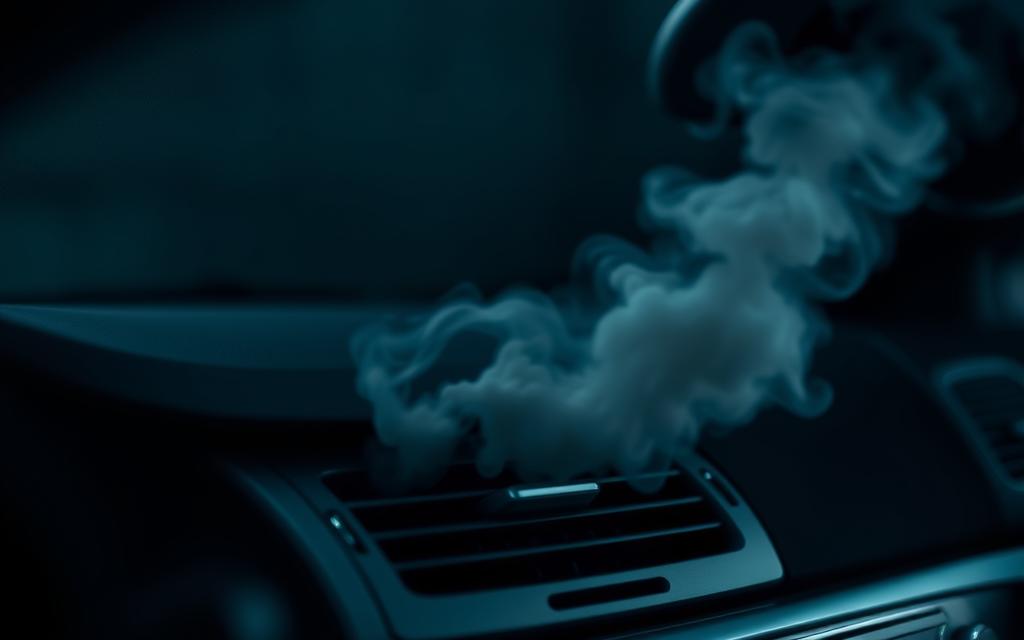
Keeping your car’s air conditioning (AC) system in good shape is key to avoid smoke or vapor from the vents. By taking early steps, you can stop these problems and keep your AC working well. Let’s look at some important steps you can take.
Regular Maintenance Tips for Your AC Unit
It’s crucial to regularly service your car’s AC unit. This means checking the refrigerant levels, looking for leaks, and making sure everything works right. If you skip this, you might face overheating, which can cause smoke or vapor from the vents.
Checking and Changing Cabin Air Filters
Cabin air filters are important for keeping the air in your car clean. They can get clogged with dirt, debris, and mold, leading to smoke or vapor. Always check and change your cabin air filters as the maker suggests to avoid these issues.
Cleaning AC Ducts and Vents
Dust, dirt, and other stuff in your car’s AC ducts and vents can cause smoke or vapor problems. Make cleaning these areas a regular part of your routine. This ensures they’re clear of anything that could block airflow and cause trouble.
| Preventative Measure | Benefit |
|---|---|
| Regular AC Unit Maintenance | Helps prevent overheating and refrigerant leaks, reducing the risk of smoke or vapor emissions. |
| Cabin Air Filter Replacement | Ensures clean, filtered air circulates through the AC system, minimizing the chances of mold and mildew growth. |
| Cleaning AC Ducts and Vents | Maintains proper airflow and prevents the buildup of contaminants that could contribute to smoke or vapor issues. |
By taking these steps, you can greatly lower the chance of smoke or vapor problems with your car’s car ventilation smoking and automobile HVAC smoke systems. Regular maintenance, air filter changes, and duct cleaning are key to a smooth and efficient AC system.
The Role of Cabin Air Filters
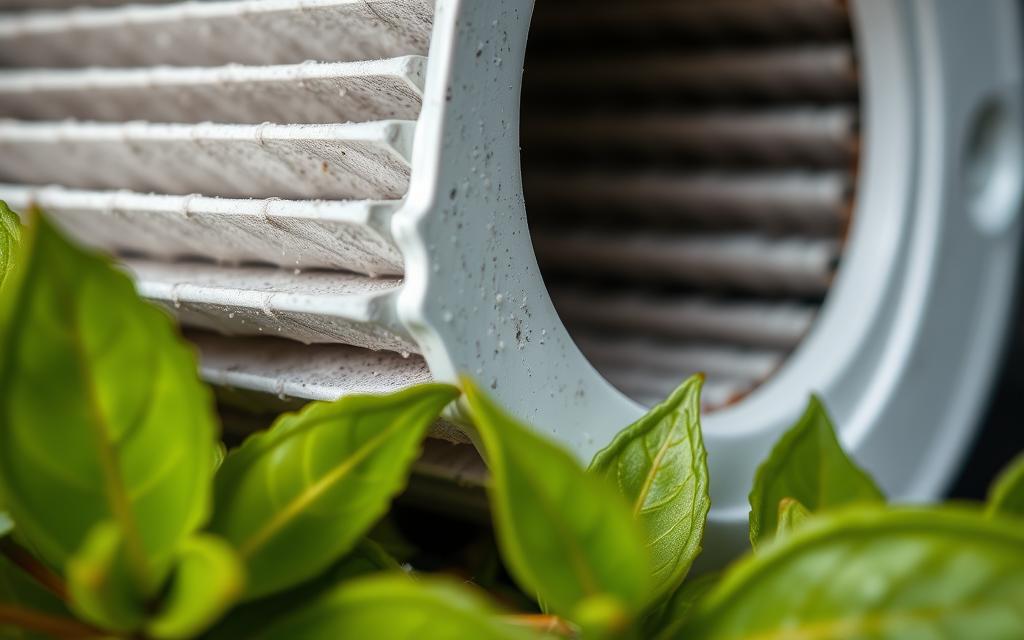
Cabin air filters are key to keeping the air in your car clean. They catch pollutants and allergens before they get inside. This means you and your passengers can breathe healthier air while driving.
How Filters Affect Air Quality
Standard cabin air filters can trap particles as small as 0.3 microns. This includes pollen, soot, and mold spores. Even some germs are caught too. But, HEPA filters can catch even smaller particles, down to 0.14 microns.
Coronavirus particles are smaller than what HEPA filters can block. They range from 0.06 to 0.14 microns.
Signs of Clogged or Damaged Filters
Driving in dusty areas or places with poor air can clog your filter fast. Look out for signs like less air from the vents, musty smells, and a weaker HVAC system. If you see these, it’s time to check and replace the filter.
When to Replace Cabin Air Filters
Change your cabin air filter every 15,000 miles or as your car’s manual says. The right filter, like the PUREFLOW® High Efficiency Particulate Cabin Air Filter, offers extra protection. It keeps out mold, fungi, and dangerous gases.
Replacing a cabin air filter is easy and quick, taking about 15 minutes with simple tools. Regular maintenance keeps your car’s HVAC system working well. This ensures clean, fresh air for everyone in the car.
Importance of System Inspections
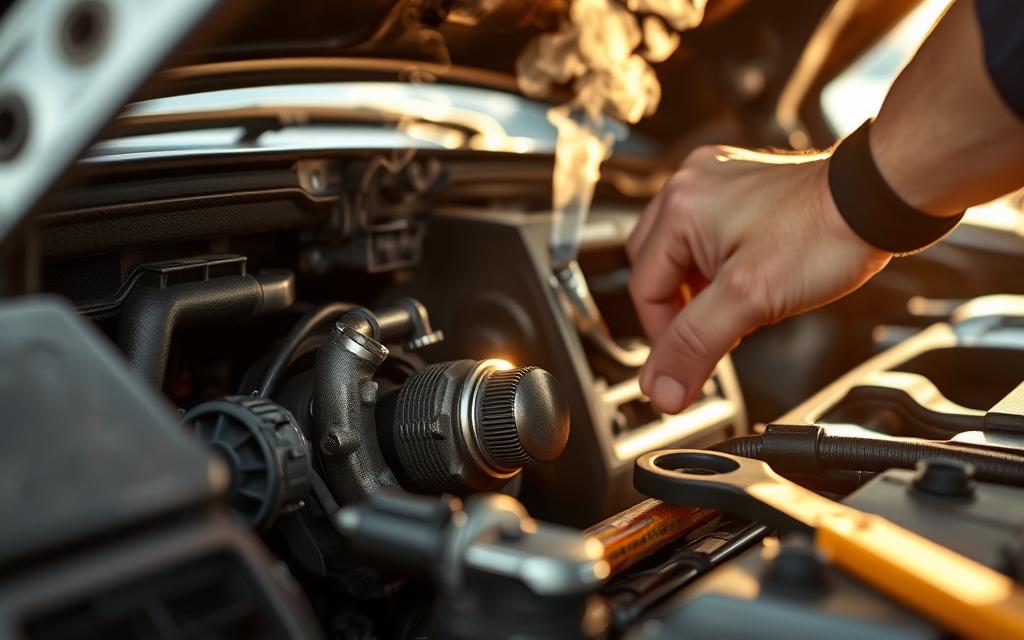
Regular checks on your car’s AC system are key to avoiding expensive repairs later. Spotting small problems early can stop them from getting worse. Mechanics should look closely at the compressor, condenser, and refrigerant lines. This ensures the system works well and spots any issues.
Regular Check-Ups to Avoid Issues
Getting regular car AC system check-ups is the smart way to stay ahead. These inspections help mechanics find and fix problems before they get worse. This saves you time, money, and the trouble of dealing with a vehicle air vent smoke problem.
What Mechanics Should Inspect
- Compressor: Checking the compressor’s condition and operation to ensure it is functioning correctly.
- Condenser: Inspecting the condenser for any signs of damage or obstruction that could impede airflow.
- Refrigerant Lines: Examining the refrigerant lines for leaks or wear and tear that could lead to refrigerant loss.
- Electrical Components: Verifying the integrity of electrical connections and sensors to identify any potential malfunctions.
Signs You Need a System Inspection
Watch for these signs that your car AC system might need a check-up:
- Unusual noises or vibrations coming from the AC system
- Decreased cooling efficiency or inability to maintain a comfortable cabin temperature
- Intermittent or persistent vehicle air vent smoke emissions
- Unusual odors or poor air quality from the vents
Fixing these problems quickly can prevent more damage. It keeps your AC system running smoothly. This ensures a comfortable ride for you and your passengers.
Common Myths About AC System Smoke
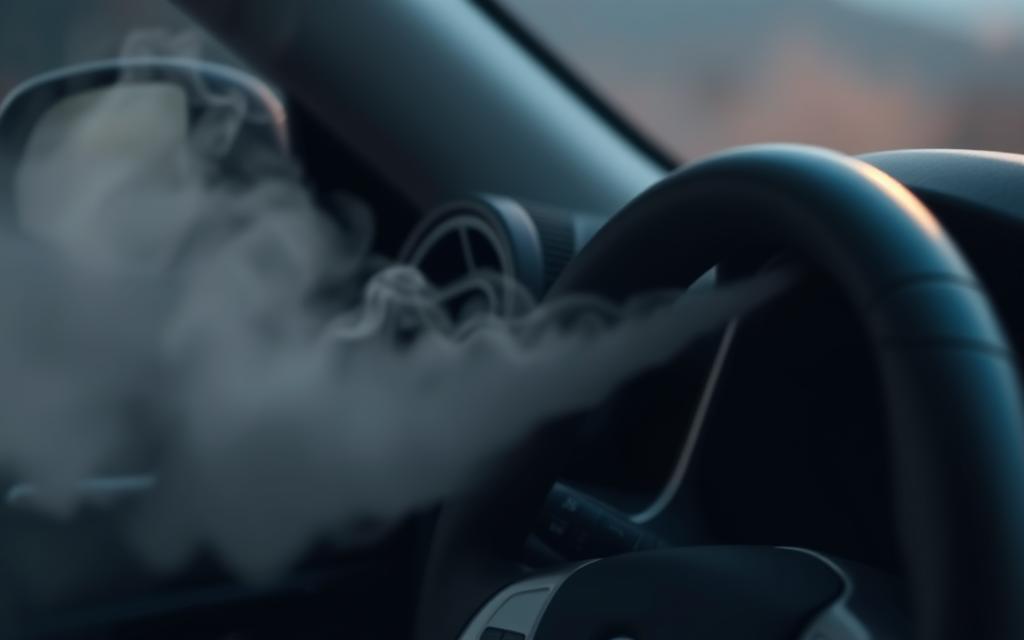
When smoke comes out of your car’s AC vents, it’s scary. But, not all smoke is bad. There are many myths about AC system smoke that need to be cleared up.
Debunking Misconceptions About Smoke Causes
Many think any smoke from the AC vents means a big problem. But, it’s not always true. Sometimes, a small leak or an electrical issue can cause smoke.
Myths vs. Reality: What You Should Know
- Turning off the AC might not fix the smoke problem. Sometimes, keeping it on can help find and fix the issue.
- Smoke colors mean different things. White, blue, and black smoke can point to different problems that need different actions.
Understanding the Risks Involved
Smoke from the AC vents is not something to ignore. But, the danger might not be as big as you think. Studies show in-car smoke can be much worse than in a smoke-free home, harming kids the most.
The danger depends on the smoke’s color, smell, and how long you’re exposed. Fixing the problem fast and getting help can lower the risks. It keeps your car safe and comfy for everyone.
Effect of Weather on AC Performance

The weather can greatly affect your car’s air conditioning (AC) system. Humidity and heat can cause problems like smoke or vapor from the vents.
How Humidity and Heat Impact AC Functionality
In summer, your car’s AC works harder to cool the cabin. High humidity can cause condensation, leading to white smoke or vapor from the vents. Also, hot temperatures can strain the engine and AC system.
Seasonal Maintenance for Your Car’s AC
Regular seasonal maintenance is key for your car’s AC. Check refrigerant levels, inspect the compressor, and clean the cabin air filter. This helps prevent car AC blowing smoke or car ventilation smoking, keeping you cool all year.
When Weather Changes Affect Your System
Seasonal changes can impact your car’s AC system. For example, the sudden rise in temperature and humidity in spring can strain the AC. Monitoring your system helps catch and fix issues early.
Understanding weather’s impact on your car’s AC and maintaining it ensures a comfortable drive. This is true no matter the weather outside.
Understanding AC Refrigerants
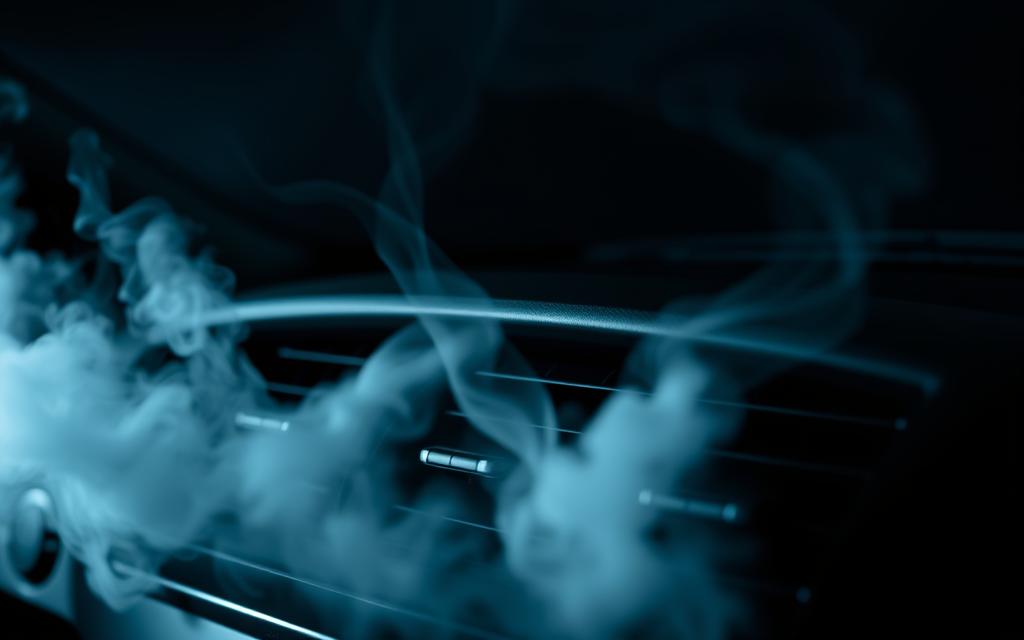
Keeping your car’s air conditioning (AC) system healthy is important. Refrigerants play a key role in this. They are the fluids that cool the air inside your vehicle. Different refrigerants have unique properties and characteristics.
Different Types of Refrigerants Used in Vehicles
The most common refrigerants in car AC systems are:
- R-134a: A hydrofluorocarbon (HFC) refrigerant that replaced the older, ozone-depleting R-12.
- R-1234yf: A newer, eco-friendly refrigerant that’s replacing R-134a in newer cars due to its lower global warming potential.
Signs of Refrigerant Leaks
Refrigerant leaks can cause AC system problems. Look out for these signs:
- AC cooling performance drops.
- You hear a hissing or bubbling sound from the AC.
- See oil stains around fittings or connections.
- The AC compressor runs constantly or cycles on and off too much.
How Refrigerant Issues Can Cause Smoke
Low refrigerant makes the compressor work harder, producing more heat. This heat, with a leak, can vaporize refrigerant, causing smoke or mist in the vents. Refrigerant leaks can also lead to engine overheating, causing smoke or vapor emissions. Fixing refrigerant leaks quickly is key to keeping your car’s automobile HVAC smoke working right and avoiding car air conditioning malfunction.
| Refrigerant Type | Properties | Compatibility |
|---|---|---|
| R-134a | – Hydrofluorocarbon (HFC) refrigerant – Moderate global warming potential |
– Compatible with most vehicles manufactured before 2015 |
| R-1234yf | – Hydrofluoroolefin (HFO) refrigerant – Low global warming potential |
– Gradually replacing R-134a in newer vehicle models |
“Addressing refrigerant leaks promptly is essential to maintaining the proper functioning of your car’s air conditioning system and preventing further issues.”
When to Consult a Professional
Dealing with an automotive AC smoke issue or a car AC system smoking problem? Knowing when to get help is key. Ignoring signs can lead to expensive fixes later. So, it’s important to act fast and stay alert.
Warning Signs You Should Never Ignore
- Persistent smoke or unusual odors coming from the AC vents
- Discolored or abnormal smoke, such as black, blue, or acrid-smelling smoke
- Sudden loss of cooling performance or decreased airflow from the vents
- Unusual noises or vibrations coming from the AC system
The Cost of Delaying Repairs
Ignoring these signs can cost a lot. For instance, fixing frozen AC lines or a damaged evaporator can cost $250 to $500. Replacing a faulty serpentine belt and pulleys can cost between $175 and $450. Fixing problems early can save you from bigger, more expensive repairs later.
Finding the Right Mechanic for Your Needs
Finding a good mechanic for AC system repair is crucial. Look for shops with certified technicians and a good reputation. Get quotes from different places and compare them to find the best deal.
By being vigilant, understanding the costs of delay, and finding the right help, you can fix AC smoke problems. This keeps your car’s cooling system working well.
Long-Term Solutions for Smoke Issues
If your car’s air vents keep smoking, it’s time for a fix. Upgrading parts of your air conditioning (AC) system can help. This can make your AC work better and cut down on smoke.
Upgrading Components for Better Performance
Think about upgrading the vehicle air vent smoke parts like the compressor, condenser, and evaporator. These changes can make your AC cooler and less likely to smoke.
The Benefits of Professional AC System Overhauls
For a deeper fix, get a pro to overhaul your car AC unit smoke emission system. They’ll check and fix all parts, solving any hidden problems. It might cost more upfront, but it’s worth it for long-term benefits.
Understanding the Lifespan of Car AC Systems
Remember, smoke can mean your AC is getting old. Car AC systems usually last 10 to 15 years, depending on how much you use it. As it gets older, parts can wear out, causing more issues. Knowing this can help you plan for future repairs or replacements.
By focusing on long-term fixes, like upgrading parts and getting professional overhauls, you can avoid vehicle air vent smoke and car AC unit smoke emission problems. This will make your car more reliable and comfortable to drive.
Educating Yourself About Vehicle Maintenance
Being a responsible car owner means knowing about your vehicle’s maintenance. This is very important when you notice smoke from the AC vents. Learning about the causes and how to fix problems early can help you avoid bigger issues.
Resources for Car Owners on AC Issues
There are many resources for car owners to learn about AC problems. You can find information in manufacturer manuals, online forums, and automotive websites. These sources can help you understand and fix smoke issues in your car’s AC system.
How to Stay Informed About Car Repairs
It’s also key to know about general car maintenance and repairs. Learning about common problems, repair costs, and the need for regular maintenance helps you make smart choices. Websites and blogs about cars can be great resources for this knowledge.
Workshops and Classes for DIY Vehicle Maintenance
For those who like to get their hands dirty, workshops or classes on DIY car care are great. These can teach you how to troubleshoot and repair your car. Learning these skills can save you money and help you understand your car better.
Being proactive about your car’s maintenance, like the AC system, can prevent expensive repairs. By using available resources and learning opportunities, you can keep your car in top shape.
Conclusion: Staying Ahead of AC Issues
Keeping your car’s air conditioning system in good shape is key for a comfy drive, more so in summer. Being proactive and fixing issues early can prevent smoke from your AC vents. This avoids the hassle and dangers of such problems.
Importance of Early Detection
Spotting and fixing AC problems early is crucial. Regular checks, filter swaps, and quick action on odd signs can keep your AC running well. Early detection means quicker fixes or maintenance, saving you from bigger, pricier issues later.
Summary of Key Points for Maintaining Your Car AC
To keep your AC system in great condition, get it serviced by a pro often. This includes checking refrigerant, cleaning parts, and replacing filters. Also, check the compressor and belts for damage. Doing these tasks well can make your AC last longer and work better.
Final Thoughts on Car Care and Smoke Prevention
Being proactive and catching issues early is key to avoiding AC smoke. Stay alert, follow the service schedule, and fix any odd signs fast. This way, your car’s AC will keep you cool and comfortable for many years.
FAQ
What can cause smoke or steam to come from the AC vents in a car?
How can I identify the type of smoke or vapor coming from the AC vents?
What are some common scenarios when smoke or vapor can come from the AC vents?
What should I do if I notice smoke coming from the AC vents while driving?
How can I diagnose the source of the smoke or vapor coming from the AC vents?
What are some preventative measures I can take to avoid smoke issues in my car’s AC system?
How can the condition of my cabin air filters affect the AC system and potential smoke issues?
When should I have my car’s AC system inspected by a professional?
Are there any common myths about AC system smoke that I should be aware of?
How can weather conditions affect the performance of my car’s AC system and potentially contribute to smoke or vapor emissions?
What do I need to know about the refrigerants used in my vehicle’s AC system?
When should I consult a professional mechanic for my car’s AC system issues?
Are there any long-term solutions for recurring smoke issues in my car’s AC system?
How can I educate myself about maintaining my vehicle’s AC system and preventing smoke issues?

Jack Thompson is a writer and seasoned auto mechanic with over 15 years of experience in the automotive industry. Known for his expertise in vehicle mechanics, Jack has a deep understanding of car and truck systems. His skills, honed through years of hands-on experience, have made him a trusted name in the field. Jack is committed to providing valuable insights into car maintenance and repair, helping vehicle owners keep their vehicles in top condition.

